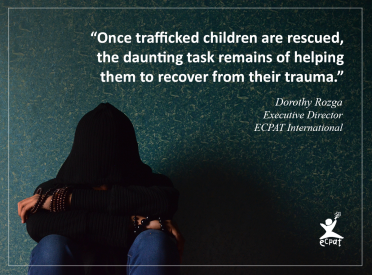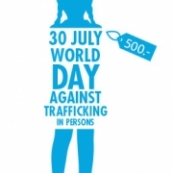
blog by Dr. Mark Kavenagh, Head of Research and Policy, ECPAT International
 Sophie was only 13 when she was taken from her home and exploited at the hands of a relative. Barred from attending school and forced to perform household chores, she was left destitute precisely when she needed support and care the most.
Sophie was only 13 when she was taken from her home and exploited at the hands of a relative. Barred from attending school and forced to perform household chores, she was left destitute precisely when she needed support and care the most.
Human trafficking for the purposes of forced labour or sexual exploitation is the third largest crime industry in the world, behind drugs and arms trafficking. Almost one third of human trafficking victims in the world are estimated to be children.
Far from being restricted to less developed countries, human trafficking sees no boundaries and affects various groups of people regardless of their gender, age, or ethnicity. All regions are affected, and all countries can be a destination, source and transit point for traffickers.
Commonly understood as “the recruitment, transportation, transfer, harbouring or receipt of a person by such means as threat or use of force or other forms of coercion, abduction, fraud or deception for the purpose of exploitation,” human trafficking, is not always well understood. Many social service providers may have encountered clients who have experienced forms of trafficking, though clients may not disclose this to practitioners, and in some cases, may not even self-identify as victims.
Although a large number of detected trafficking victims are women (almost 60 percent based on UNOCD estimates), we now understand that children and men are represented among victims in much higher numbers than previously thought. The latest figures also show that a growing number of cases take place at the domestic or regional level, with research showing that traffickers and their victims often “come from the same place, speak the same language or have the same ethnic background.”
Factors leading to trafficking are wide-ranging and complex and can include poverty; globalization; corruption; weak rule of law, and poor law enforcement. It is important to keep in mind however, that victims and survivors of human trafficking have diverse socio-economic backgrounds; varied levels of education; and may be documented or undocumented. Many are deceived or coerced, initially believing that they have been hired for a real job, or that they are going to get married, before finding themselves trapped and powerless.
Law enforcement bodies are key in dealing with the identification and protection of victims, but they are far from alone in fighting human trafficking and social services providers are a big part of the solution in support for victims and in moves to eradicate this pervasive crime. The ECPAT International Network, which includes 104 member organisations across 93 countries, plays an active role in the fight against the trafficking of children for sexual purposes: both on the frontline, by providing helplines and direct support to victims; and behind the scenes, by conducting research, advocacy and policy monitoring. A number of ECPAT members act to prevent children from being trafficked and sexually exploited, particularly through early or forced marriages, prostitution, by travellers and tourists and in online child sexual abuse material.
In many ways, the needs for social care of trafficking victims don’t differ substantially from those of other clients seeking care from helping professionals. A range of supports can be provided - from counselling to cope with traumatic experiences, through to supported reintegration back into communities – with attention to the push factors that may have put people at risk in the first place.
In serious cases, particularly involving children, specialist care and support is necessary. Some members, like ECPAT Foundation in the North of Thailand, employ specialist child protection staff with social work backgrounds to educate young people on the risks to consider when migrating for work, relevant laws to protect themselves, and how to access support when they need it. Others, like ECPAT USA, concentrate their efforts on leading public awareness campaigns such as the #doesyourhotelknow campaign, to alert the private sector and ordinary citizens of the role private businesses and particularly the travel and tourism industry can play in safeguarding children from exploitation. Many of our members engage with the private sector and encourage companies to implement a child protection code of conduct. Others are more involved with governments and development partners in drafting and supporting policies that protect children and criminalise offenders.
 From producing research and leading support groups and shelters, to running campaigns and petitions at the regional and global level, ECPAT International’s work is varied and comprehensive. However, despite making headway in protecting children from trafficking and exploitation, ECPAT International cannot abolish the practise on its own and needs the help of other organisations and individuals to do so.
From producing research and leading support groups and shelters, to running campaigns and petitions at the regional and global level, ECPAT International’s work is varied and comprehensive. However, despite making headway in protecting children from trafficking and exploitation, ECPAT International cannot abolish the practise on its own and needs the help of other organisations and individuals to do so.
The international community has already committed to “take effective measures to eradicate forced labour, modern slavery and human trafficking” and to “end abuse, trafficking and all forms of violence and torture against children” by 2030 via the UN Sustainable Development Goals. To raise public awareness of trafficking, the international community will observe World Day Against Trafficking in Persons on July 30. Now is the time to act and put an end to this crime, collectively and permanently.
___________________________________________________________________________________________________________________________
ECPAT International
ECPAT International is a global network of organisations (104 member groups in 93 countries) dedicated to combating the sexual exploitation of children. The ECPAT International Secretariat is based in Bangkok, Thailand, and is the administrative and supporting unit of the network. The Secretariat coordinates and supports a range of network initiatives including research, programming and active campaigning along with the development of tools and provision of technical support to the global ECPAT network.
Dr. Mark Kavenagh, Head of Research and Policy, ECPAT International
Mark Kavenagh joined the ECPAT International Secretariat as Head of Research and Policy in early 2018 where he oversees a range of research projects that focus on ending the sexual exploitation of children. Mark began his career as a registered psychologist and worked in school settings with children and adolescents before moving into international development a decade ago. Since then, Mark has lived and worked in South East Asia and Eastern Europe in child protection programming and research roles. Most recently he worked for ChildFund Australia as their Child Protection Advisor. Mark holds a Doctorate of Educational Psychology from the University of Melbourne.
